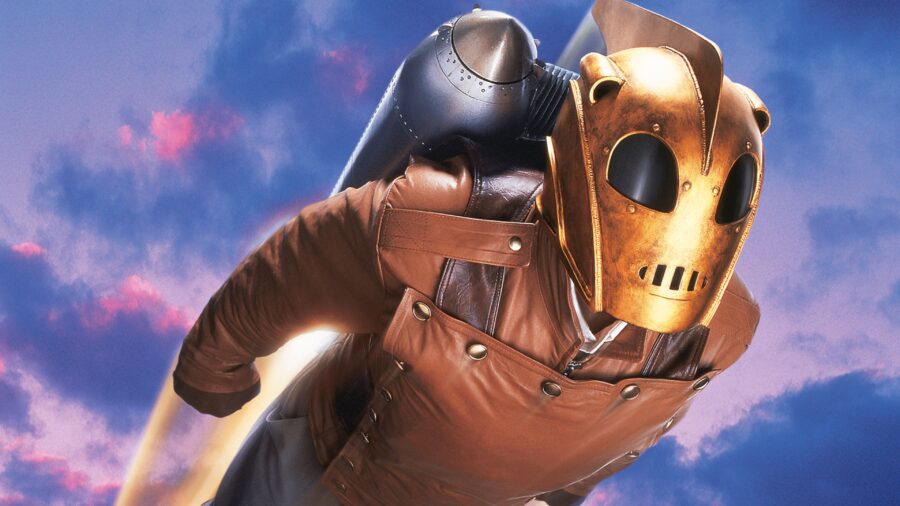The Most Underrated Superhero Movie Of The 1990s Is Streaming On Disney+
1991's pulp-inspired superhero movie The Rocketeer is streaming on Disney+.

It is fair to say that superhero movies are pretty popular these days, with the rival Marvel Cinematic Universe and DC Universe dominating cultural conservation. However, this was not always the case in previous decades, when movies based on comic books were largely dismissed out of hand, with major exceptions like 1978’s Superman: The Movie and 1989’s Batman. The single most underrated superhero movie of this time period, 1991’s The Rocketeer, is currently streaming on Disney+ and perpetually on the verge of a major revival.
The Rocketeer stars Billy Campbell as Cliff Secord, a barnstorming pilot in the late 1930s who stumbles across an experimental jetpack hidden by gangsters who stole it from real-life business magnate, engineering genius, experimental aviator, and weirdo Howard Hughes (Terry O’Quinn, best known from Lost). Cliff’s first idea is to use the jetpack to make money in an aerial show with his buddy Peevy (Alan Arkin) but quickly gets into a mess when his girlfriend Jenny (Jennifer Connelly) is romanced, then kidnapped by a Hollywood star/Nazi secret agent Neville Sinclair (Timothy Dalton).

More than anything else, The Rocketeer echoes the Indiana Jones franchise, which makes sense, considering they were both based on the same kind of pulpy movie serials from the 1940s. The movie was adapted from a 1980s comic book by Dave Stevens (who appears in a brief cameo as a Nazi aviator), inspired by nostalgia for mid-century adventure tales.
The Rocketeer directly references pop culture much more directly than Indiana Jones tends to do, with the original version of Jennifer Connelly’s character being a clear homage to pin-up model Bettie Page and former James Bond Timothy Dalton’s nefarious, swashbuckling movie star being modeled on The Adventures of Robin Hood actor Errol Flynn, who was posthumously alleged (without evidence) to be a Nazi agent.
Jennifer Connelly’s character was changed from referencing one of the preeminent sex symbols of the 20th Century to a virtuous girl-next-door type has to do with one name: Disney. After several failed attempts to adapt The Rocketeer, the Walt Disney Company got the rights to adapt the comic and swiftly began transforming it into a family-friendly brand. Stevens later said that Disney turned it into a “kiddie property so they could sell toys,” but there was another key element to the film adaptation.

Namely, Tim Burton’s Batman, which had been released only two years before and immediately became a multimedia sensation, grossing $411 million, producing a Billboard number one album for Prince, and selling more toys, video games, and other merchandise than studio executives could have dreamt. Studio executives being the creative minds they tend to be, there was a widespread assumption that the success of Batman meant one thing: children want more 1930s pulp heroes.
The Rocketeer was the first of a wave of post-Batman movies that attempted to replicate Burton’s art deco-inspired film, which would also include the Alec Baldwin movie The Shadow and Billy Zane’s The Phantom. While both of those movies flopped hard at the box office, The Rocketeer made back its budget; however, at a $35 million budget, the grosses were not enough to persuade Disney to proceed with plans for sequels.
Since then, there has been an animated sequel to The Rocketeer (with Billy Campbell returning to voice a character) and constant talks of a reboot of some kind. As recently as November of 2022, an announced new installment in The Rocketeer franchise fell into doubt when its director decided to step away from the project.
But The Rocketeer deserves more now (and then) than it has ever gotten. The movie has a kind of straightforward heroism and sincerity that is rarely seen in an age of superheroic snark and meta-storytelling, with brilliant iconography to match. Hopefully, Disney will someday get it together and realize what it has.










